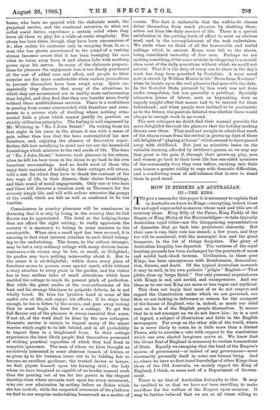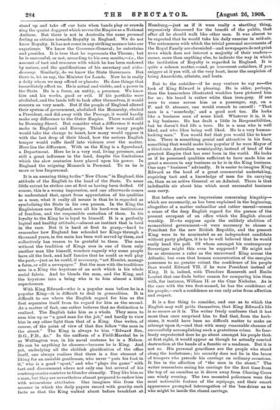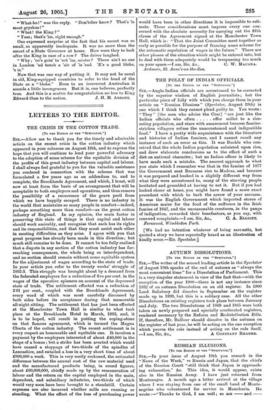HOW IT STRIKES AN AUSTRALIAN. III.—THE KING.
TO give a reason for this paper it is necessary to explain that in Australia we know no Kings,—excepting, indeed, those few and aged superseded monarchs whose rank and title are of courtesy alone. King Billy of the Paroo, King Paddy of the Bogan, or King Micky of the Murrumbidgee—to take typically Australian royal titles—are the disappearing representatives of dynasties that go back into prehistoric obscurity. But their race is run, their rule has ceased; a few years, and they too will be numbered, with the marsupial lion and the giant kangaroo, in the list of things forgotten. The glory of Australian kingship has departed. The vastness of the royal hunting-grounds has been exchanged for the precincts of mean and sordid back-block taverns. Civilisation, to these poor Kings, has been synonymous with drunkenness, demoralisa- tion, disease, and death. Of the typical Australian monarch it may be said, in his own pathetic "pidgin" English—" That pfella close up 'longa finish." Our only personal acquaintance with Kings is sad, and sordid, and unimpressive. And our ideas as to our real King are more or less vague and mythical.
This does not imply that most of us do not respect and regard the Constitution under which we are governed, nor that we are lacking in deference or esteem for the occupant of the throne of England, who is, indeed, as much our chief man as he is of the English people themselves. It means that he is not amongst us, we do not know him ; he is a sort of legend, a subject of illustration and fable in the English newspapers. Far away on the other side of the world, where he is never likely to come, he is little more than a distant Power, able to exercise a veto with respect to the conclusions which our own elected lawgivers arrive at. We know that the Great Seal of England is necessary to certain transactions of State. Equally we recognise that the head of the Empire's system of government—or indeed of any government—must necessarily personify itself in some one human being. And so, where we have no first-hand knowledge of other Kings than those of the Old Australia, we mainly regard the King of England, I think, as some sort of a Department of Govern- ment.
There is no hint of Australian disloyalty in this. It may be credited to us that we have not been unwilling to make sacrifices for the welfare of the Empire upon occasion. It may be further believed that we are at all times willing to
stand up and take off our bats when bands play or crowds sing the quaint doggerel which serves the Empire as a National Anthem. But there is not in Australia the same personal feeling as obtains towards Royalty in England. We do not know Royalty. It has not come in any striking manner into our experience. We know the Governor-General ; he entertains and presides. It is true that he represents the Throne ; but he is successful, or not, according to his own merits,—i.e., the amount of tact and resource with which he has been endowed by nature, and the qualifications of his secretary and aides- de-eany. Similarly, do we know the State Governors. But there is, let us say, the Minister for Lands. Now he is really a deity whom we may offend or placate. He does things that immediately affect us. He is actual and visible, and a power in the State. He is a force, an entity, a presence. We know him and his works, good or evil. If his portfolio were abolished, and the lands left to look after themselves, it would concern us very much. But if the people of England altered their system of government, abolished the Monarchy, elected a President, and did away with the Peerage, it would hardly make any difference to the Outer Empire. There would still be Downing Street. But consider what a difference it would make in England and Europe. Think bow many people would take the change to heart, bow many would oppose it with the last drop of their blood, how the serious English temper would ruffle itself into violence over the matter. Here lies the difference. With us the King is a figurehead, a Department. Here he is a very real, living presence, and still a great influence in the land, despite the limitations which the slow centuries have placed upon his power. In England the reigning Monarch is Personal. To us he is more or less Impersonal.
It is an amazing thing to the "New Chum" in England, this attitude of the English to the head of the State. To some little extent he strikes one at first as having been deified. Of course, this is a wrong impression, and one afterwards comes to understand that, apart from appreciation of his qualities as a man, what it really all means is that he is regarded as symbolising the State in his own person. In the King the Englishman sees England, sees all his bard-won institutions of freedom, and the responsible custodian of them. In his loyalty to the King he is loyal to himself. It is a perfectly logical and healthy attitude,—almost an instinct that is bred in the race. But it is hard at first to grasp,—hard to remember how England has schooled her Kings through a thousand years, in the main has been well served by them, and collectively has reason to be grateful to them. The man without the tradition of Kings sees in one of them only another man like himself, wonders vaguely why some people have all the luck, and half fancies that he could as well play the part,—just as he could, if necessary, "act Hamlet, manage a farm, or edit a newspaper." But the man with the traditions sees in a King the keystone of an arch which is his whole social fabric. And he blends the man, and the King, and the keystone into a being who is to him almost a little superhuman.
With King Edward—who is a popular man before he is a popular King—it is difficult to deal in generalities. It is difficult to see where the English regard for him as the first separates itself from its regard for him as the second. As a matter of fact, one rather believes that no distinction is realised. The English take him as a whole. They seem to sum him up as "a good man for the job," and hardly to view him in any other light than that of a King. One writes, of course, of the point of view of that fine fellow "the man in the street." The King is always to him "Edward Rex, D.G., F.D., &c." In the uniform of a Field-Marshal he is as Wellington was, in his naval costume he is a Nelson. He can be anything he chooses—because be is King. And yet, underlying all the childish glorification of the office itself, one always realises that there is a fine element of liking for an amiable gentleman, who never "puts his foot in it," who is a good "sport," and who "plays the game" with tact and discernment where not only one but several of his contemporaries contrive to blunder clumsily. They like him as a man, but they are nevertheless almost prepared to endow him with miraculous attributes. One imagines this from the manner in which the daily papers record with gravity such facts as that the King walked about before breakfast at
Homburg,—just as if it were really a startling thing, expensively discovered for the benefit of the public, that after all he should walk like other men. It was almost to be expected that he would take his daily exercise in mid-air. The seriousness with which the trivial personal movements of the Royal Family are chronicled—and newspapers do not print news which does not interest a majority of their readers— seems, more than anything else, to indicate the way in which the institution of Royalty is regarded in England. It is quite a solemn matter,—and, ye irreverent outsiders, if you snigger at it you will, at the very least, incur the suspicion of being Anarchists, atheists, and louts.
But to the outsider—if be may venture to say so—the look of King Edward is pleasing. He is older, perhaps, than the humourless illustrated weeklies have pictured him for us ; his beard is rather white than iron-grey. If one were to come across him as a passenger, say, on a P. and 0. steamer, one would remark to oneself : "That man is a 'somebody,' and a good sort too. He looks like a business man of some kind. Whatever it is, it is a big business. He has dealt a little in Responsibilities, but he doesn't find life a bore. He is a man who is well liked, and who likes being well liked. He is a very human- looking man." You would feel that you would like to know him. There is something genial and attractive in his face, something that would make him popular if he were Mayor of a third-rate Australian municipality, instead of head of the greatest Empire that has ever been in the world. He looks as if he possessed qualities sufficient to have made him as great a success in any business as he is in the King business. One says " business " advisedly. It is easier to imagine King Edward as the head of a great commercial undertaking, requiring tact and a knowledge of men for its carrying on, than as an active General or an Admiral. There is that indefinable air about him which most successful business men carry.
But before one's own impressions concerning kingship—. which are necessarily, as has been explained in the beginning, altogether of a matter unfamiliar and rather unreal—comes a sense of the deep English regard for the person • of the present occupant of an office which the English almost worship. If—to suppose again the unlikely abolition of monarchical government—it were necessary to choose • a President for the new British Republic, and the present King were to be nominated as an independent candidate without party pledges, it is to be well believed that he would easily head the poll. Of whom amongst his contemporary Sovereigns might this even be supposed P He might net be so strenuous a ruler as the uncrowned King across the Atlantic, but even that human concentration of the energies possesses to no greater extent the confidence of his people than would Edward VII. if he were President instead of King. It is, indeed, with Theodore Roosevelt and Emile Loubet that one finds better reason for comparing him than with, for instance, William II. or the Czar Nicholas. As is the case with the two first.named, he has the confidence of his people,—such a confidence as can only arise from affection and respect.
It is a fine thing to consider, and one as to which the English may well pride themselves, that King Edward's life is so secure as it is. The writer freely confesses that it has more than once surprised him to find that, from the kerb- stone, it would have been no difficult matter to make an attempt upon it,—and that with many reasonable chances of successfully accomplishing such a gratuitous crime. So fear- lessly unprotected does he go about amongst his people that, at first sight, it would appear as though be actually courted destruction at the hands of a fanatic or. a madman. But it is not so. His personal guardians are the people who stand along the kerbstones ; his security does not lie in the brace of troopers who precede his carriage on ordinary occasions. It lies in the affection of "the man in the street." The writer remembers seeing his carriage for the first time from the top of an omnibus as it drove away from Charing Cross one windy evening. The two mounted policemen were the most noticeable feature of the equipage, and their smart appearance prompted interrogation of the 'bus-driver as to who might be inside the closed carriage.
" What ! the King ?"
" Yuss ; that's lin, right enough."
One expressed surprise at the fact that his escort was so small, so apparently inadequate. It was no more than the escort of a State Governor at home. How were they to look after the King in case of a row ? The driver laughed.
" Why ; 'oo's goin' to 'urt 'im, mister ? There ain't no one in London 'ucl touch a 'air of 'is 'ead. 'E's a good bloke, 'e is."
Now that was one way of putting it. It may not be usual in old, King-equipped countries to refer to the head of the State as a "bloke." Even to an irreverent Australian it sounds a little incongruous. But it is, one believes, perfectly true. And this is a matter for congratulation no less to King
Edward than to the nation. J. H. M. ABBOTT,




































 Previous page
Previous page